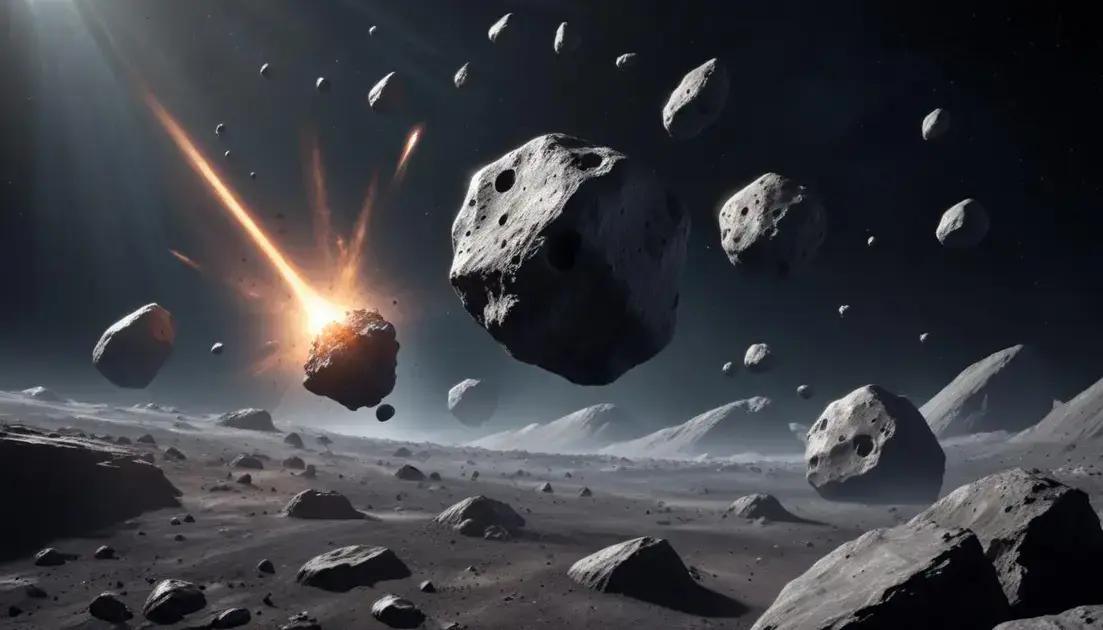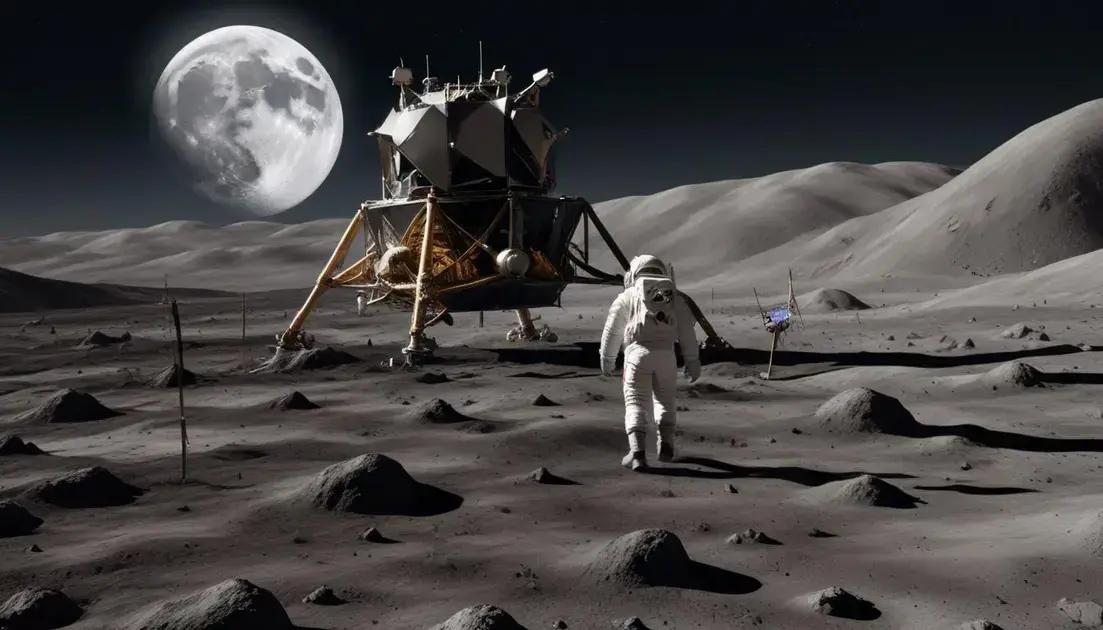
Space Mining: The Race for Asteroids
Space mining is emerging as a promising field, with both companies and governments investing in the extraction of valuable materials from asteroids. Technological innovations, including robotic explorers and advanced propulsion systems, are driving this industry forward. However, challenges such as high costs, legal issues, and ethical concerns must be addressed. The future of space mining holds great potential for changing resource distribution, but open discussions and international collaboration will be crucial for its success.
Space Mining is not just a buzzword anymore; it’s a frontier that’s capturing the imagination of entrepreneurs and scientists alike. What does it mean for our future?
The Rise of Space Mining
Space mining is becoming a hot topic in today’s world. Companies are eyeing asteroids for precious resources. They believe these celestial bodies hold metals like gold, platinum, and more. Imagine harvesting these valuable materials right from space!
What Is Space Mining? Space mining refers to the process of extracting useful resources from asteroids and other celestial bodies. Unlike traditional mining on Earth, this is done in space. The technology is evolving, making it more feasible and exciting than ever.
Many experts expect that asteroids contain enough resources to meet our needs for centuries. The idea of space mining could play a crucial role in supporting future space missions. It can also help fuel industries back on Earth.
Not only can space mining provide essential materials, but it also opens up possibilities for jobs and economic growth. Imagine new jobs in the space sector! Young people today could be the pioneers of this new industry.
Challenges Ahead However, there are challenges to consider. The costs of launching missions can be very high. There are also legal and ethical issues regarding ownership of resources found in space.
Even with challenges, the benefits make space mining appealing. It’s a thrilling new frontier that can lead us to a better understanding of our universe. Could space mining be the next big thing for humanity? Only time will tell!
Technological Innovations in Asteroid Retrieval
Technological innovations are changing how we think about asteroid retrieval. New tools and methods help us reach and extract resources from asteroids. Exciting advancements in robotics play a big role in this process.
Robotic Explorers are key players in space mining. These machines can travel to asteroids, analyze their composition, and collect samples. They reduce the need for human crews on dangerous missions. It’s safer and more efficient.
Another important development is improved propulsion systems. These systems allow spacecraft to reach asteroids faster and with less fuel. This means we can plan more missions and gather more resources.
Also, new mining technologies make extraction easier. Techniques like laser ablation and thermal mining can gather materials without damaging the asteroid. They provide better results and make the process smoother.
Communication technology is also getting better. This means we can send data from far away faster and more reliably. It helps scientists monitor missions and make decisions in real time.
These innovations make space mining a promising field. As we develop new tools, the possibilities for asteroid retrieval keep expanding. Who knows what we could discover in the near future?
Ethical Implications of Space Resource Exploitation
As we explore space mining, it’s important to consider the ethical implications. Extracting resources from asteroids raises many questions. Who owns these resources? Should we claim them for ourselves or share them with humanity?
Environmental concerns also come into play. Mining asteroids could affect their stability. If we’re not careful, we might create space debris. This could pose risks for future missions and satellites.
Another issue is impact on Earth. If we start bringing back valuable metals, how will that change our economy? Prices could drop, affecting jobs in traditional mining sectors.
Cultural and legal considerations are also vital. Many countries have different laws about space resources. There’s no clear agreement on how to manage them. The Outer Space Treaty is a first step, but it needs updates to reflect current technology and practices.
Before we rush into space mining, we need to discuss these concerns openly. Involving both the public and experts in the conversation can help us make thoughtful choices. Our decisions now can shape the future of space resource use for generations.
Global Players in the Space Mining Industry
The space mining industry is growing quickly, and many global players are involved. Companies from various countries are stepping up to explore asteroids. These companies include both private firms and government agencies.
Private companies are often at the forefront. They invest in technology and missions to retrieve space resources. For example, companies like Planetary Resources and Deep Space Industries are leading the way. They focus on identifying valuable asteroids and planning missions to collect resources.
Governments also play a big role. Agencies like NASA and the European Space Agency (ESA) are exploring ways to mine space. They conduct research and collaborate with private companies. Their experience helps shape the industry.
Countries like China and Russia are investing heavily in space mining too. They see it as vital for future energy and resource needs. Their ambitious plans could change the landscape of the space mining industry.
International collaborations are becoming more common. These partnerships share knowledge and resources. They help reduce costs and risks. Working together can lead to successful missions and a better understanding of space resources.
As more players join the market, competition will increase. This could lead to faster technological advancements and more efficient mining methods. The space mining race is just beginning, and it promises exciting developments ahead!
Future Prospects and Challenges
The future prospects for space mining look bright, but challenges remain. As technology advances, we can expect to see more successful missions. Companies and governments are investing heavily in research and development.
Potential benefits include access to rare materials that could boost economies. These resources could help meet global demand for metals and minerals. The ability to mine asteroids could change the way we view resource distribution on Earth.
However, there are challenges we must consider. High costs are a major hurdle. Launching missions and developing technology requires significant funding. Companies will need to figure out how to make space mining profitable.
Legal and ethical issues also pose challenges. There’s no clear ownership of resources in space. International laws need to be updated to address these concerns. Collaboration between countries will be essential to avoid conflicts.
Lastly, public perception of space mining could impact investment. People may worry about the effects on the environment, both in space and on Earth. Engaging the public in discussions about the benefits and risks is vital.
Despite these challenges, innovative ideas are emerging. The space mining industry has the potential to revolutionize our approach to natural resources. The next few years will be critical for shaping the future of this exciting field!
Conclusion
In conclusion, the future of space mining holds incredible potential. As technology progresses, we can unlock valuable resources from asteroids. This can change how we view resources on Earth and support various industries.
However, challenges such as high costs, legal issues, and public perception must be addressed. Open discussions about the ethics of space mining are crucial. By engaging with the public and collaborating internationally, we can navigate these obstacles together.
The journey ahead is full of exciting possibilities. With innovation and teamwork, we can pave the way for a new era in space exploration and resource utilization. Space mining may not just be a dream; it could be our next big leap forward!


